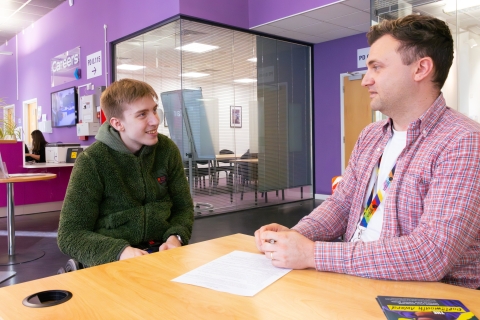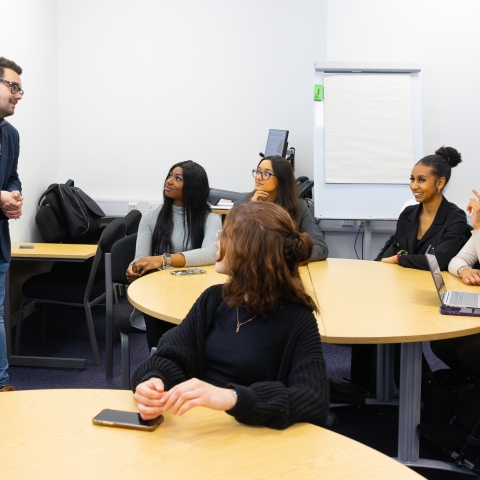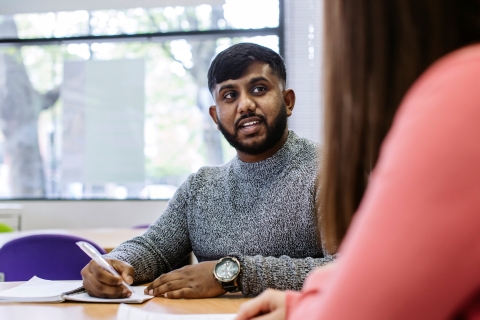
Interviews are commonly the most nerve-wracking part of the recruitment process. Our guide is here to equip you with all the information you need about interviews and make sure you go in with confidence.
Apply for £250 to support application and placement expenses
We’ve partnered with Santander to offer 60 £250 awards to help our students take the next career step. This could help with interview travel and clothing, placement or internship essentials and more.
Types of interview
When you are invited to an interview you will told what format this will be held in. These include:
Face-to-face panel interview
This is the most common type of interview, where several recruiters will take turns asking questions. Usually, panels may consist of anywhere between 2-4 people.
Technical interview
These interviews are often used in STEM roles, where questions focus on a particular area of knowledge.
Telephone interviews
Used in the early stages of an application process, these interviews still follow the format of a standard panel interview.
Video Interviews
These interviews may be live or pre-recorded. The employer will provide guidelines on the software you will need for the interview ahead of time.
You may be invited to an assessment centre which includes an interview as part of the day. To learn more about assessment centres and find out how to prepare, visit our Guide to Assessment Centres.
Disability, equality and diversity
Under the Equality Act 2010, employers must make reasonable adjustments to the selection process if applicants have declared disabilities. If you believe you have any conditions that may impact the selection process, inform the employer in advance so they can make any necessary adjustments.
For further information on disclosing a disability, please view the Careers and Employability Service's Diversity Guides.
Preparing for your interview
You should put some time aside before your interview to do some preparation and ensure you are confident answering any questions they may ask. Some key ways to do this include:
- building on the employer research you conducted during your application
- revisiting your application to refresh your memory of the key skills and attributes the employer was looking for
- conducting a skills audit against the job description
- consider the types of questions that the recruiter may ask
To get you started with your interview prep, TargetJobs has created an online learning module called "How to take the guesswork out of interview prep".

Been asked to prepare a presentation? Don't Panic!
TartgetJobs has a guide dedicated to creating and presenting a great presentation for interviews. It includes an online learning module to help you prepare.
Interview questions
Although you won’t know exactly what questions you may be asked in an interview, there are common types you can prepare.
Below are some examples of the types of questions you may be asked:
These questions help the employer to understand why you are applying for that particular role.
The employer wants to ensure you have a good understanding of what the role involves and see if you have carried out research into the organisation.
How to answer these questions
To answer these questions successfully you should demonstrate:
- an understanding of the company’s unique selling point and plans
- you have or are interested in developing some of the skills or strengths the role requires, which you can find in the job description
- how your personality and interests match the role
Examples include:
- Tell us a little bit about yourself.
- Why did you apply for this role?
- How could we help you achieve your career goals?
Competency-based questions evaluate the skills, abilities and behaviours that will help you to be successful in a job. Employers will identify competencies that are particularly important to their organisation and the specific job role they're applying for. Job descriptions and adverts often list the key skills required for a role.
How to answer these questions
As a student or graduate, you may have a limited amount of work-related examples to draw on but aim to use a different example for each competency you're asked to discuss.
To give a thorough response, use the STAR technique:
- Situation – briefly describe the background to the situation and provide context
- Task – specifically describe your responsibility at the time
- Action – describe what you did
- Result – describe the outcome of your actions and what you could have done differently
Where possible, try to relate your answers to the role you're interviewing for.
Examples include:
- Can you give me an example of when you worked in a team?
- Give an example of a time when you showed initiative.
- Have you ever had to deal with conflict?
Strength-based interview questions are all about predicting your future potential, what you are particularly good at and what inspires you.
How to answer these questions
Interviewers are looking for an engaged and motivational response to these questions. Although they are difficult to prepare for, remember to listen to the questions carefully and know that you can take a short pause or ask for the question to be repeated.
Examples include:
- Do you work best in a team or by yourself?
- How do you judge success?
- How do you feel when you are faced with a sudden obstacle to your plans? What do you do to resolve it?
These questions are used to evaluate whether you share the same values as the organisation. They’re also helpful to employers to see if you would be a good fit for their team. Common values that employers may be looking to identify, especially in a corporate environment, may include:
- Social responsibility – this includes consideration of social and environmental solutions to business issues and operations
- Integrity – this involves acting with professionalism and transparency and adhering to the organisation's policies
- Collaboration – working effectively with others to meet shared goals
- Innovation –developing and implementing new ideas to improve the performance of the organisation/business
- Customer/client orientation – working positively to both maintain and increase customer or client satisfaction
- Accountability –taking responsibility for both actions and decisions in team and individual projects
How to answer these questions
Ensure you have researched the company’s values. You can often find these on their main website. You can also look at any recent news about the business as this can provide a topic for discussion in these questions.
You can also align your values to your skills and way of working.
Examples include:
- Talk us through a situation where you were successful. Why do you think it was a success?
- Tell us about a mistake you’ve made. What did you do about it and what have you learned from it?
These questions require you to reflect on your skills and experiences. Employers may be assessing your resilience and ability to adapt to a new workplace and role.
How to answer these questions
Remember, an employer isn't expecting you to be a 'superhuman'. Don't be afraid to talk about examples of where you asked for help. Resilience isn't about being unaffected by stress or pressure. It's about the ability to recognise this and build on coping strategies to manage it. Resilience isn't a static quality.
When discussing weaknesses, you can positively frame your answer by picking characteristics that you've actively taken steps to improve. For example, self-confidence issues could have previously led to difficulty accepting criticism, but tell the interviewer that you've learned to embrace constructive feedback as it allows for self-improvement.
Examples include:
- Identify three of your main weaknesses.
- Tell me about a time when you worked with someone you didn't agree with.
- How do you cope with pressure?
Learn more about questions about weaknesses, failures and resilience
These questions are designed to see if you can think on your feet and to find out how you'd deal with a particular situation. Rather than being asked to describe a past experience, you're presented with a hypothetical scenario.
How to answer these questions
There is not a right or wrong answer scenario-based or situational questions. However, you must provide a clear plan of action about how you would deal with such a situation.
Where you can, back up your answer. What is your thought process behind this – to support colleagues, to follow procedures, to manage expectations of others, to limit the impact on the workplace and individuals involved?
It can be tricky to prepare for these types of questions, but it's important to think through the types of situations you might find yourself in based on the role description. Also, consider the skills and qualities they may be looking for in their suitable candidate based on the person specification.
Examples include:
- "You're due to deliver an event as part of your role, but find that you're short-staffed. How would you manage this?"
- "You're managing the front reception desk and you need to deal with an angry and disgruntled customer. How would you respond to them?"
- "Two important colleagues in the organisation demand your attention at the same time. What would you do?"
They are designed to assess specialist skills essential for effective performance in the job role. Some employers will favour a separate technical interview, while others might combine technical questions with general questions in one main interview.
Preparing for technical questions
Know the foundations of your subject inside out
The employer is likely to ask you in-depth questions about the course and the units or subject areas you've covered. So make sure you revise the basics and pay particular attention to topics directly related to the organisation's area of work.
Be confident in talking about the projects and assignments you've worked on
Interviewers will focus on project work to assess your ability to carry out independent work, manage your workload and solve problems related to a specialist area. In offering a summary of your project work, discuss the challenges you faced, how you overcame any problems and talk positively about the outcomes.
Consider how you'll explain technical concepts
While some of your interview panel may be familiar with technical terminology and concepts, other individuals might be more interested in how you can convey complex ideas in a simplified and concise way.
Demonstrate knowledge about developments in the sector/industry
Showing an understanding of recent trends and developments, such as advances in types of technology used by the employer, will highlight your interest and enthusiasm in working with them. Also, consider the employer's activities in line with these.
It won't always be about getting the correct answer
While there will be some specific, knowledge-based questions, the employer may also ask you to comment on a range of scenarios or hypothetical scenarios. Even if you're not sure of the correct response, tell the interviewer how you might approach the problem or how you might source the correct information or support.
Technical questions will focus on how you communicate technical ideas and information. They don't require you to know and be able to recall everything. So if you're unclear about a question during the interview, have the confidence to ask for further clarification.
If you feel you're struggling to convey information, you can ask for a piece of paper to sketch out or produce a diagram to expand upon your response. This may be particularly relevant for engineering-based roles.
Top tips for technical interviews
- Where you can, avoid using jargon – assume your interviewees have limited knowledge so you don't miss out basic, but vital information.
- When discussing your experience and achievements, make sure you focus on your contribution to these events.
- Listen to the questions carefully before starting to respond and be confident in asking for clarification, where necessary.
- Don't forget, even if it's a technical interview, the employer will still be looking for you to evidence and demonstrate transferable skills, such as communication and personal skills – you need to show that you can work well with others and communicate your ideas clearly.
While people may find certain types of questions more challenging than others, we've identified common questions that might need more preparation.
Examples include:
"Tell me about yourself"
This warm-up question might be used to ease you into the interview process. But don't underestimate the importance of your response to this. Your answer needs to find a good balance between showing your personality, while also reflecting the focused, professional self you intend to convey throughout the interview.
View this as an opportunity to sell yourself to the interviewer. You could outline your academic and professional journey to the point of your interview, making sure you include information about your skills and attributes. You could also discuss an interest or hobby you have.
"Why do you want to work for us?"
This question is about your motivation for applying to the role. Make sure before attending an interview that you're clear about why you want to work for the organisation. Think about what they do as well as the direction of their organisation and how you would help them achieve their goals.
Good employer research plays a vital role here. This is more than a case of looking at what appears on the company homepage. It's about showing a genuine understanding of the employer – their values, strategy, structure and place within their sector. See our full guide to researching an employer.
"Where do you expect to be in 5 years' time?"
This is a question that allows you to show off your employer research and your understanding of your career progression. Show your enthusiasm, without coming across as arrogant.
Tailor your response to reflect the nature of the organisation, the sector or industry, and your own experiences and skills. Overall, you'll want to demonstrate your commitment to your career path, the company and hard work.
"What are your weaknesses?"
The trick here is to positively frame your answer by picking characteristics that you've actively taken steps to improve. For example, self-confidence issues could have previously led to difficulty accepting criticism; but tell the interviewer that you've learned to embrace constructive feedback as it allows self-improvement. Overall, these questions aim to test your problem-solving skills and assess your self-awareness.
"Why do you think you'll be successful in this job?"
This isn't an invitation from the recruiter to boast. They'll be expecting you to discuss your strengths and qualities and match them to the requirements of the role.
Keep your response specific – why are you suited to this job more than another? Make sure you've considered how your skills, interests and experience link to the job role and the company.
Questions that deal with an issue of conflict
These questions are difficult because they challenge you to address the issue of conflict directly. The employer will be looking for you to show awareness of some common sense principles for reducing the risk of conflict, how to handle it when it occurs and putting in place measures to ensure it doesn't happen again.
Questions that aim to clarify information
Make sure you've re-read your application content before the interview and that you're happy and confident in answering any related questions.
Questions to ask the employer
At the end of the interview process, the employer will offer you the opportunity to ask them any questions you may have. An interview isn't usually the time to ask questions about pay, benefits or perks unless the employer raises this.
Examples of questions to ask the employer:
- "What support does the organisation offer to new graduates?"
- "How often is a graduate's performance appraised?"
- "What development plans does the organisation have?"
- "What is a typical career path in this job role?"
- "What are the company's expectations of the role?"
- "What will the priorities be?"
What to expect on the day
Making a good impression is key to interview success. Having completed some preparation for your interview here are some key things to consider:
Before you arrive:
- Check the details – Confirm the time, format, and contact person.
- Plan your journey – If attending in person, know the location and arrive early.
- Test technology – If online, check your internet, camera, and microphone.
- Prepare documents – Bring copies of your CV, portfolio, or other required materials.
- Dress appropriately - Make sure your appearance is clean, tidy and professional.
- Arrive 10–15 minutes early if attending in person. If online, log in 5 minutes before.
During the Interview
Body language and communication
- Make eye contact and smile.
- Sit up straight and avoid crossing your arms.
- Listen carefully and pause before answering to gather your thoughts.
Presenting yourself well
- Speak clearly and at a steady pace.
- Show enthusiasm for the role and company.
- If unsure about a question, ask for clarification before answering.
At the end of the interview, ask when you can expect to hear a decision. This will help you have a time frame while you are waiting to hear back.
After the interview
Got the job? Fantastic news! Interviews can be stressful so be incredibly proud of yourself for your achievement.
Didn't get the role? Don't worry - it's normal to face rejection before securing a job. Use the experience to improve for next time:
- Request feedback - Email the employer within a week of hearing back to thank them for their time and ask for feedback on what went well and what could be improved.
- Build resilience - Use the feedback to strengthen your next application. Stay positive and keep applying.
- Improve your employability - If you're struggling to find a job, consider volunteering or work experience to build skills. You can also complete online learning to expand your knowledge or gain an additional qualification.
Further support
If you need further support and advice about interview preparation then you can speak with an adviser for interview hints and tips, or a mock interview.
To book a full mock interview, please get in touch with us, or visit us the Careers and Employability Centre. Remember, if you're not on campus you can still access our services by booking a telephone or Google Meet appointment.
More support from the Careers and Employability Service
Guide to assessment centres
Discover the assessment tasks, exercises and interviews you'll take part in when you attend an assessment centre.

Psychometric and aptitude tests
Organisations use psychometric and aptitude tests to assess personal attributes, characteristics, intelligence and general abilities.

Applications
Follow our guide to completing application forms and sending speculative applications in order to stand out to employers.

Enable University alerts
Turn on notifications for critical updates like closures, safety alerts, and urgent service disruptions.







